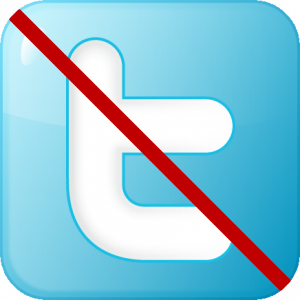If you are active on social media—meaning that you post items to your Facebook page, Tweet or comment online—you need to be familiar with your employer’s personnel policy or your employment contract.

Be careful what you Tweet; there could be consequences. Image: By –Steindy (talk) 21:47, 16 September 2013 (UTC) [Public domain], via Wikimedia Commons
For example, the Kansas Board of Regents—a governing board of the state’s universities and public higher education institutions—recently updated their personnel policy to designate “improper use of social media” as an offense for which one could potentially be fired. According to this article by Slate, the policy revision was prompted by the Twitter tirade of a University of Kansas journalism professor who blamed the NRA for the fatal shooting of 12 people at Washington Navy Yard last September. Although an extreme example, this type of “discourse” is not uncommon; a quick survey of comments on almost any social or political issue will confirm. Despite the seeming pervasiveness of the political correctness ethic these days, most informal internet posts are neither politically (read: diplomatically) nor factually correct.
As discussed in the article, the Kansas Board of Regents’s policy attempts to mimic—and succeeds in oversimplifying—the precedents set by the United States Supreme Court in Pickering v. Board of Education (1968) and Garcetti v. Ceballos (2006) by adopting a balancing test between the interest of an employee’s right “to speak on matters of public concern” and the university’s interest in “promoting the efficiency of the public services it performs.” Subject to this test, “improper use of social media” may mean any communication through social media that “impairs discipline by superiors or harmony among co-workers, has a detrimental impact on close working relationships for which personal loyalty and confidence are necessary, impedes the performance of the speaker’s official duties, interferes with the regular operation of the university, or otherwise adversely affects the university’s ability to efficiently provide services.”
The Board of Regents has now decided to appoint a work group to review the revised policy for now. However, government employers—particularly academic institutions—generally grant much more leniency than private entities, though there are certainly exceptions. There’s a growing trend toward personnel policies that authorize employers to regulate (or at least reserve the right to monitor) employee online activity.
So before you tweet, post or comment, know your personnel policy, and think.






